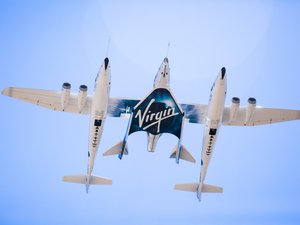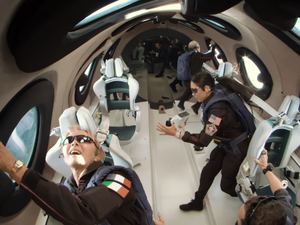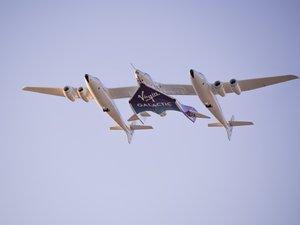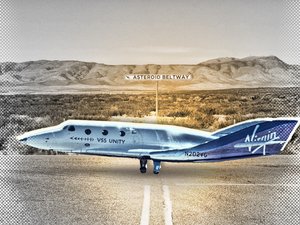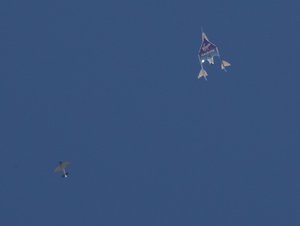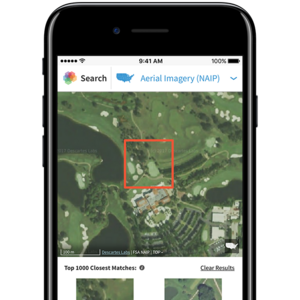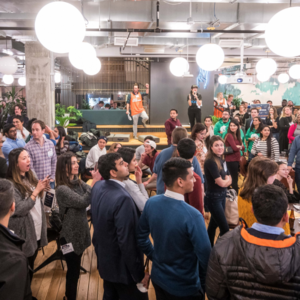
Virgin Galactic expects the first flight tests of its Delta-class ships to take place out of New Mexico's Spaceport America in mid-2025, the space tourism company said during its third-quarter earnings call Wednesday, as it cuts its overall workforce by 18%.
Michael Colglazier, Virgin Galactic's CEO, announced a strategic realignment of company resources aimed at focusing on that Delta program in a company-wide email to employees on Tuesday. That move, according to Colglazier, will "focus the entire company on realizing the profit potential from these ships," he said during Virgin's Q3 earnings call.
In relation to that strategic realignment, Virgin Galactic (NYSE: SPCE) cut its workforce by approximately 185 employees, or about 18% of its total workforce. The company expects to have around 840 full-time employees entering 2024, Colglazier said during the earnings call.
Those reductions, he said, will be seen primarily in the teams that support the company's spaceline operations — which include preparing Virgin Galactic's spaceships for flight — and staff areas. Representatives from Virgin Galactic couldn't immediately be reached for additional details on what percentage of the company's New Mexico workforce was affected by that reduction.
Virgin Galactic employs about 300 people in New Mexico and is the anchor tenant at Spaceport America, where it leases the "Gateway to Space" building.
While Virgin Galactic's spaceline operations employees are among those affected by its workforce reduction, Colglazier said during Wednesday's earnings call that the company's "highly skilled spaceline operations teams" in New Mexico will be a part of the Delta-class spaceships' build process.
That means, Colglazier said on the call, the teams that will maintain the Delta-class ships in New Mexico will have the "hands-on experience" of building them, as well. That, in turn, he said, will help Virgin Galactic more quickly ramp up its Delta class service.
Revenue service with Delta-class ships is expected to start in 2026, following a period of both static and flight testing throughout 2025, Colglazier said.
Although the company has previously said its Delta-class ships would be expected to fly four times per month, or once a week, Colglazier provided an updated figure during Wednesday's earnings call. The Delta-class ships are now, he said, expected to be able to fly eight times per month, or at a cadence of twice per week.
That's a significant jump over Virgin Galactic's current Unity class of spaceships, which fly at a cadence of one flight per month.
Because of that increased flight cadence, Virgin Galactic expects its Delta-class ships, once in what Colglazier called "steady-state operations," to pull the company into positive cash flow starting in 2027. Revenue estimates provided by Virgin during its Q3 earnings call indicate it expects monthly revenue per Delta ship to be between $21.6 to $28.8 million.
Currently, Virgin Galactic is bringing in between $1.8 and $2.4 million in revenue per month per ship with its Unity class of spaceships. Its Delta-class ships, which are designed to have six seats instead of the Unity class's four seats, are expected to generate $2.7 million to $3.6 million in revenue per flight, depending on whether it's a private astronaut or research mission.
The building of those Delta-class ships is set to take place at an assembly factory near Phoenix, which Colglazier said is expected to come online in Q2 2024. That facility's core and shell are "all done," he said, and the company expects interior fit-out to take place in April with assemblies from Virgin Galactic's two sub-assembly partners, Bell Textron Inc. and Qarbon Aerospace, to arrive middle of next year.
As a part of Virgin Galactic's pivot to focus on the Delta program, flights out of Spaceport America are expected to slow down in 2024, Colglazier said.
The company is planning to fly its Unity ships at a rate of once per quarter, instead of the recent rate of once per month. Virgin Galactic is planning to pause those Unity spaceflights in mid-2024.
Its next flight, "Galactic 06," is currently scheduled for January, with another, "Galactic 07," expected "in the earlier side of the second quarter," Colglazier said on the call. At that point, depending on the Delta ships' progress, Virgin's following flight could launch with a Delta-class ship instead of one of its current Unity-class ships.
While Colglazier said Virgin Galactic has had "incredible success" flying its Unity-class ships, the "business reasons" for flying Unity, he said, are to "demonstrate what this industry's about." That includes, he added, demonstrating the ships' safety, flight repeatability and customer experience.
"Unity is demonstrating all that, but it is very resource-consumptive as we do it," Colglazier said. "So the big move we're making here is pivoting the resources that have been being put into the Unity flights and redirecting them over to get the Delta ships done with the cash we have on hand, and take that market risk off the table."
Colgalzier and Chief Financial Officer Doug Ahrens said Virgin Galactic has about $1.1 billion in cash, cash equivalents and marketable securities on hand that they expect to be "sufficient" in order to reach positive cash flow with the company's Delta-class spaceships.
Virgin Galactic also saw a jump in revenue of nearly $1 million in Q3 2023 compared to the same period last year thanks to commercial spaceflights and membership fees related to future astronauts. The company has flown commercial missions out of Spaceport America five times this year, including a successful research mission last week.
Although Virgin Galactic's stock price (NYSE: SPCE) dropped Tuesday on news of the strategic realignment and workforce reduction, it's currently trading after-hours about 12.82% above its price at close on Wednesday, which was $1.56, per MarketWatch.
